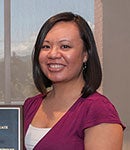Prior to fall 2013, Boise State University’s online Master of Science in Organizational Performance and Workplace Learning (OPWL) was known as the Master of Science in Instructional and Performance Technology (IPT).
A few years after completing my bachelor’s degree, I found myself working as an instructional designer and loving it. However, I never had any formal education in this field, so I developed the majority of my skills through on-the-job experience. While I had a great, knowledgeable team and was successful in my position, I realized that there were gaps in my knowledge of instructional design that I needed to fill if I intended to continue in this field. I had the “how” of instructional design, but I was missing the foundational “why” of instructional design. After being accepted into a different program, I decided to do one more search. The Instructional & Performance Technology (now Organizational Performance & Workplace Learning) program at Boise State surfaced, and my interest was piqued. I learned that this program is well-established and recognized as a leader in the field of human performance technology (HPT). I found its curriculum well-rounded and broader than just my focus in training.
I was fortunate to spend my first two years in the program on campus, where every discussion was stimulating and my professors and peers challenged me to think beyond my immediate realm of experience. I completed my third year of the program online, and the discussions were just as thought-provoking and interactive as they were in the classroom. The program attracts an impressive caliber of students around the world who possess a wide range of experience. Learning from the experience of not only my professors, but also my peers was invaluable, allowing me to see HPT in action in other organizations.
The reading, assignments, and projects helped me build a strong foundation through theory and practical experience. In this program, students apply what they learn through real-world, community-based projects. It’s a great way for us to gain experience while benefitting real organizations, from global corporations to local businesses and non-profits.

I enrolled in the program as a part-time student and maintained my full-time job. Indeed, it was challenging to juggle the workload, but the staff understood and provided support every step of the way. They want us to succeed as students and as professionals.
Through this program, I was able to close many knowledge and skill gaps that I had when I started. I move forward with a strong foundation of “why” that enables me to design more innovative and comprehensive programs and solutions. I am able to approach projects with a more well-rounded perspective and view my work through the broader lens of human performance technology. I am more confident and engaged in discussions about HPT. I even have a better understanding of the business that I support in my current position.
Although challenging, joining this program has been one of the best decisions I have made for my career.
Publications
Kwan, J., Clark, S., & Villachica, S. (2015). Bringing service standards to life. In J. E. Stefaniak (Ed.), Cases on human performance improvement technologies (pp. 154-181). Hershey, PA: IGI Global.
Clark, S., Collins, A., Kwan, J., & Sesnon, A. (2012, August). Making Service Standards Real for Families in Need PerformanceXpress Newsletter, August, ’12 issue.
Kwan, J., & Clark, S. (2011). Evaluating a Consulting Methodology Training Program. PerformanceXpress Newsletter, April ’11 issue.
Award
Outstanding Graduate 2013